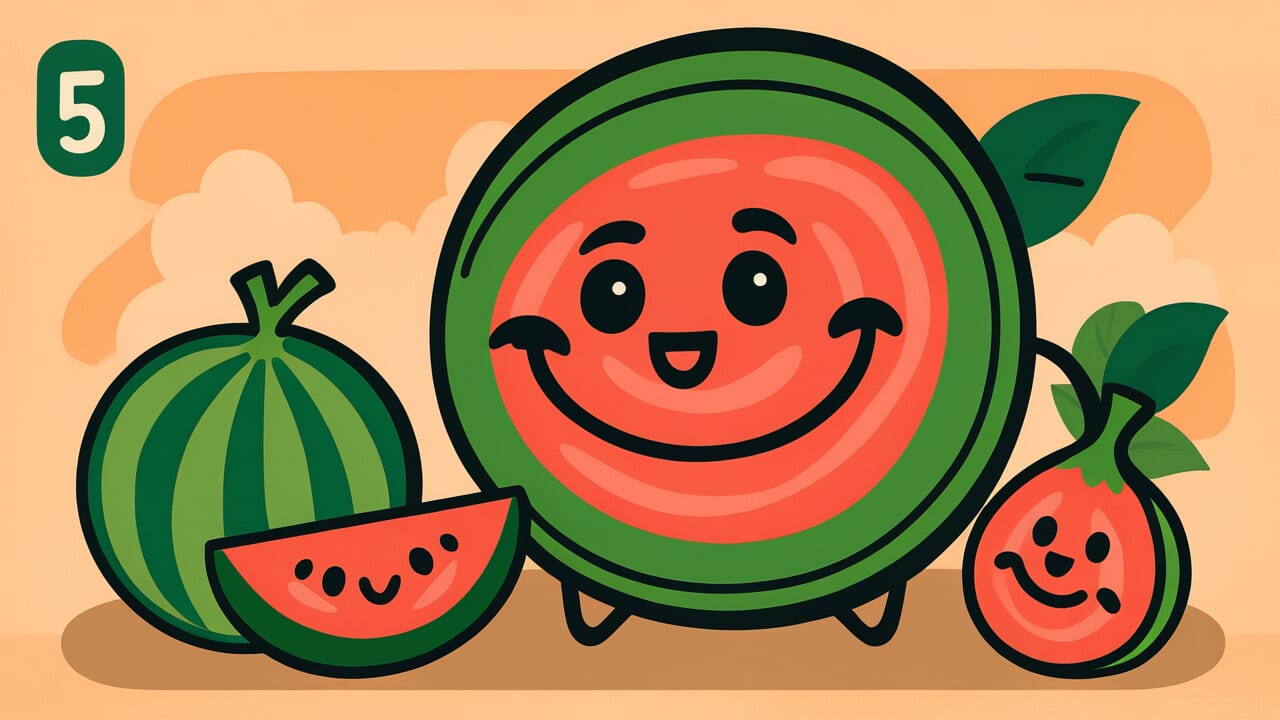How to Read “One melon seed, two round faces”
Ikka jitsu ni nigan maru
Meaning of “One melon seed, two round faces”
“One melon seed, two round faces” is a proverb that shows how people have different appearances and personalities.
Some people have long, oval faces like melon seeds, while others have round faces. This means everyone has their own unique features.
This proverb is used when recognizing human diversity and accepting differences as natural.
It applies not only to physical appearance but also to personality, ways of thinking, and abilities.
It’s an effective expression when teaching someone who feels down comparing themselves to others or worries about being different.
The message is simple: “It’s natural for people to be different.”
Today we often talk about respecting individuality and the importance of diversity.
This proverb shows that Japanese people have held such views since ancient times.
Rather than measuring people by uniform standards, it recognizes each person’s differences as natural.
This warm perspective is embedded in these words.
Origin and Etymology
No clear written records remain about the origin of this proverb. However, we can make interesting observations from how the phrase is constructed.
“One melon seed, two round faces” is a highly visual expression. It contrasts the shape of melon seeds with the shape of human faces.
Melon seeds have an elongated oval shape. The term “melon-seed face” has long been used to describe a slender, beautiful face.
Meanwhile, “round face” literally refers to a face with rounded features.
This contrast likely arose from Japanese aesthetic sensibilities and keen observation.
Looking at Edo period literature, facial shape was an important element in character descriptions.
The melon-seed face was synonymous with beauty. It was depicted as the ideal face shape in ukiyo-e prints.
However, this proverb wasn’t meant to judge beauty or ugliness.
Rather, it conveyed understanding of diversity. Some people have melon-seed faces, others have round faces.
In other words, people have different characteristics.
Using melons as an example shows something important. It reflects the Japanese spirit of accepting human differences as part of nature’s order.
Usage Examples
- I told my daughter, who was feeling down comparing herself to classmates, “One melon seed, two round faces, remember?”
- Watching the new employees at work, I feel that “One melon seed, two round faces” truly captures how diverse everyone’s personality is
Universal Wisdom
The proverb “One melon seed, two round faces” contains a fundamental truth about human society.
It offers this insight: difference is natural, and sameness is actually unnatural.
We sometimes compare ourselves to others and fear deviating from standards or averages.
But look at the natural world. Even fruits growing on the same tree never have identical shapes.
Melon seeds vary greatly. Some are elongated, some slightly rounded, some large, some small.
Since humans are also part of nature, diversity is our true form.
This proverb has been passed down for generations for a reason. People have always struggled with how to face “differences.”
Humans living in groups value harmony. Yet they constantly face the challenge of how to accept individual differences.
Our ancestors chose not to deny differences. Instead, they entrusted this proverb with the wisdom to accept them as natural.
Each person has a different face and a different heart.
Only by recognizing these differences can we achieve true coexistence.
This proverb conveys universal human wisdom. It teaches us to see diversity not as a threat but as richness.
When AI Hears This
Trying to get two round fruits from one melon is greed that ignores “the physical limits of energy allocation” from an ecological perspective.
Plants distribute energy gained through photosynthesis among growth, defense, and reproduction. But the total amount is fixed.
If a tomato plant has 100 units of energy, 10 fruits get 10 units each, while 5 fruits get 20 units each.
Farmers practice “fruit thinning” precisely to use this principle.
What’s interesting is this: the proverb’s law that “you cannot get two highest-quality products from one resource” has the same structure as ecology’s competitive exclusion principle.
Just as two bird species eating the same food cannot live in the same forest, two fruits in a melon compete for limited nutrients.
The result is either both become mediocre, or one overwhelms the other and monopolizes the nutrition.
Even more noteworthy is that this law is the biological principle of “trade-offs” itself.
Male peacocks have beautiful feathers, but their escape speed is slower as a result.
When resources are finite, gaining something always means losing something.
This proverb is a crystallization of remarkable observation. It expresses the necessity of “selection and concentration” that nature has proven over hundreds of millions of years, using just one vegetable.
Lessons for Today
This proverb teaches us the value of not fearing differences and cherishing our authentic selves.
In modern society with widespread social media, comparing ourselves to others has become easier than ever.
Many people suffer under the pressure of being “normal” or “standard.”
But as “One melon seed, two round faces” shows, “normal” doesn’t exist in the first place.
Being different from someone else is not a flaw. It’s your individuality and your unique charm.
At the same time, others being different from you is not something to criticize. It’s individuality to be respected.
At work or school, there may be a tendency to measure people by uniform standards.
But truly rich organizations and societies are places where diverse people can leverage their respective strengths.
By keeping this proverb in your heart, you can free yourself from the pain of trying to change yourself unnecessarily.
You can also become more tolerant of others’ differences. True harmony is born from recognizing differences.



Comments